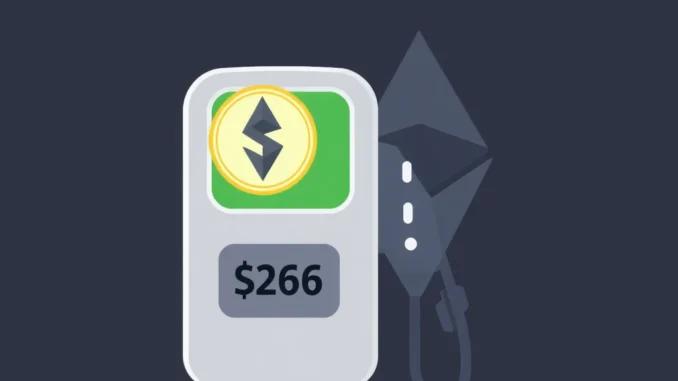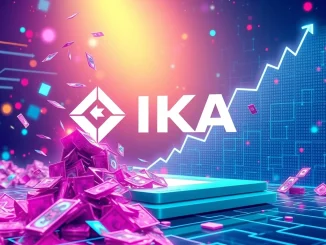
Remember the days when swapping tokens on Ethereum felt like paying for a luxury item? Sky-high gas fees were a major barrier, often making even small transactions prohibitively expensive. But hold on, the winds of change are blowing! Get ready for some fantastic news for the Ethereum community – and your wallet. We’re diving deep into the incredible story of how Ethereum gas fees have plummeted, making the network more accessible than ever before.
Ethereum Gas Fee Plummets: A Crypto Game Changer
In a truly remarkable turn of events, the average Ethereum gas fee has experienced a massive 95% decline in just one year following the highly anticipated Dencun upgrade. Yes, you read that right – 95%! This isn’t just a minor dip; it’s a seismic shift that’s reshaping the landscape of the Ethereum network and the broader crypto world. According to data from Cointelegraph, citing Etherscan, the average cost for a simple token swap has plummeted from a hefty $86 last year to a mere $0.39 today. That’s less than the price of a cup of coffee!
This dramatic reduction in crypto fees is not just good news; it’s a game-changer. It directly addresses one of the biggest pain points for Ethereum users – the often exorbitant cost of transactions. Let’s break down why this is such a monumental development:
- Accessibility for All: Lower fees mean that more people can participate in the Ethereum ecosystem, regardless of their transaction size. Small-time investors, DeFi enthusiasts, and NFT collectors can now engage without fear of crippling costs.
- Boost for DeFi and NFTs: Decentralized Finance (DeFi) and Non-Fungible Tokens (NFTs) thrive on frequent transactions. Reduced fees make these sectors significantly more viable and attractive, potentially fueling further innovation and adoption.
- Enhanced User Experience: No more agonizing over gas prices or waiting for the perfect moment to transact. A smoother, more affordable experience encourages greater network activity and user satisfaction.
Dencun Upgrade: The Catalyst for Lower Ethereum Network Fees
So, what’s the magic behind this incredible fee reduction? The answer lies in the Dencun upgrade, a significant network enhancement that went live earlier this year. This upgrade wasn’t just a minor tweak; it was a carefully orchestrated series of improvements designed to tackle Ethereum’s scalability challenges head-on and, crucially, drive down transaction costs.
The Dencun upgrade introduced several key changes, with one of the most impactful being the implementation of “proto-danksharding.” Let’s simplify this technical term:
- Data Blobs: Proto-danksharding essentially introduces a new, more efficient way to store transaction data on the Ethereum network, specifically for Layer 2 scaling solutions. Think of it as creating dedicated “lanes” on a highway for Layer 2 traffic, preventing congestion on the main Ethereum chain.
- Layer 2 Boost: By optimizing data availability for Layer 2 networks (like Optimism, Arbitrum, and zkSync), Dencun indirectly reduces the load on the main Ethereum chain. Layer 2 solutions handle a large volume of transactions off-chain and then periodically settle them on the main chain. With cheaper data storage, Layer 2s become even more cost-effective, and these savings trickle down to users.
- EIP-4844: Proto-danksharding is formally known as EIP-4844. This Ethereum Improvement Proposal is the technical backbone of this fee reduction revolution.
In essence, the Dencun upgrade acted as a powerful catalyst, optimizing the Ethereum network infrastructure to handle transactions more efficiently and at a lower cost. It’s a testament to the ongoing development and evolution of Ethereum as it strives to become a truly scalable and accessible global platform.
Benefits of Reduced Crypto Fees on Ethereum
The impact of this 95% Ethereum gas fee reduction is far-reaching and positive. Let’s explore the key benefits in more detail:
- Affordable DeFi Participation: Decentralized Finance protocols become significantly more attractive when transaction costs are minimal. Users can now engage in trading, lending, borrowing, and yield farming without being eaten alive by fees. This opens up DeFi to a much wider audience.
- NFT Trading and Minting Made Easier: The NFT space, often criticized for high gas fees, gets a major boost. Artists can mint their creations more affordably, and collectors can trade and acquire NFTs without breaking the bank. This can revitalize the NFT market and foster greater creativity and participation.
- Microtransactions Become Viable: Previously, microtransactions on Ethereum were simply not feasible due to high fees. With drastically reduced costs, new use cases emerge, such as micropayments for content, in-game transactions, and other small-value exchanges.
- Increased Network Activity: Lower fees incentivize more users to transact on the Ethereum network, leading to increased overall activity, network effects, and a more vibrant ecosystem.
- Competitive Edge: Reduced fees enhance Ethereum’s competitiveness against other blockchain platforms. It makes Ethereum a more appealing choice for developers and users alike.
Comparing Ethereum Gas Fees: Before and After Dencun Upgrade
To truly appreciate the magnitude of this change, let’s look at a direct comparison of Ethereum gas fees before and after the Dencun upgrade:
| Metric | Before Dencun Upgrade (Approx. 1 Year Ago) | After Dencun Upgrade (Current) |
|---|---|---|
| Average Gas Fee for Swap | $86 | $0.39 |
| Percentage Reduction | 95% | |
The numbers speak for themselves. A 95% reduction is not just incremental improvement; it’s a fundamental transformation. This drastic decrease in crypto fees is making Ethereum significantly more user-friendly and economically viable for a wide range of applications.
Layer 2 Scaling Solutions: Fueling the Ethereum Network Fee Reduction
While the Dencun upgrade is the primary driver behind this fee reduction, it’s crucial to understand the role of Layer 2 scaling solutions. Layer 2s have been instrumental in alleviating congestion on the main Ethereum network for some time now, and Dencun further empowers them.
Think of Layer 2s as auxiliary roads that run parallel to the main Ethereum highway. They process transactions much faster and cheaper off-chain, and then bundle them up and settle them on the main chain periodically. Popular Layer 2 solutions include:
- Optimistic Rollups (e.g., Optimism, Arbitrum): These rollups “optimistically” assume transactions are valid and only challenge them if fraud is suspected. They offer significant scalability improvements and lower fees.
- Zero-Knowledge Rollups (zk-Rollups) (e.g., zkSync, StarkNet): zk-Rollups use advanced cryptography to prove the validity of transactions off-chain, offering both scalability and enhanced security.
- Validium Chains: Similar to zk-Rollups but data availability is off-chain, further reducing costs.
Dencun’s proto-danksharding directly benefits these Layer 2 solutions by making data storage cheaper and more efficient. This, in turn, translates to even lower fees for users who transact on Layer 2 networks. The synergy between the Dencun upgrade and Layer 2 scaling is a powerful combination driving down Ethereum gas fees and enhancing the network’s overall scalability.
What Does This Mean for the Future of Ethereum and Crypto Fees?
The 95% plunge in Ethereum gas fees is a monumental step forward, but it’s important to remember that the journey to ultimate scalability and affordability is ongoing. What can we expect in the future?
- Continued Development: The Ethereum community is constantly working on further improvements. Full danksharding, the next phase after proto-danksharding, promises even greater scalability gains and potentially even lower fees in the future.
- Layer 2 Adoption Growth: As Layer 2 solutions become more mature and user-friendly, we can expect to see even greater adoption, further distributing transaction load away from the main chain and keeping fees low.
- Evolving Fee Market: Gas fees on Ethereum are dynamic and fluctuate based on network demand. While Dencun has significantly lowered the baseline, periods of high network activity could still lead to temporary fee spikes. However, the overall trend is clearly towards lower and more stable fees.
- Broader Crypto Accessibility: Ethereum’s success in reducing fees sets a positive example for the entire crypto industry. It demonstrates that scalability challenges can be overcome, paving the way for more widespread adoption and mainstream integration of cryptocurrencies.
Conclusion: A New Era of Affordable Ethereum
The dramatic 95% reduction in Ethereum gas fees after the Dencun upgrade marks a pivotal moment for the network and the crypto space as a whole. It’s a testament to the power of continuous innovation and the dedication of the Ethereum development community. By making transactions significantly more affordable, Ethereum is opening its doors wider than ever before, inviting a new wave of users, developers, and innovation.
This isn’t just about cheaper transactions; it’s about unlocking the full potential of Ethereum as a global platform for decentralized applications, finance, and the future of the internet. The era of exorbitant gas fees on Ethereum is fading, and a new era of accessibility, affordability, and growth is dawning. Get ready to explore the Ethereum network with newfound freedom and without the fear of sky-high costs – the revolution in crypto fees is here!



